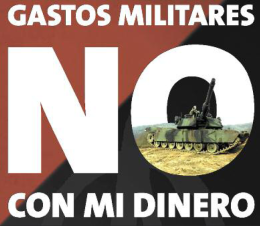The issue of Rojo y Negro, a Spanish anarcho-syndicalist monthly, has a couple of articles about war tax resistance. (Translations mine, and I’m not very good at it.)
We Continue Our Disobedience to Military Spending
At least 875 people have resisted taxes in , redirecting up to €80,600, which has been allocated to alternative projects
One year more we publicly present the data that we have compiled on objectors to military spending in different regions of the Spanish state in the tax season. Although we are aware that there are several more, there are 875 people who have reported their objection in this campaign by directly informing Antimilitarist Alternative/Conscientious Objectors Movement or other groups that promote war tax resistance and are responsible for collecting these data. In particular we are aware that at least €80,600 has been deducted from Spanish military spending and has been redirected to other citizens’ organizations that certainly will apply it to a superior end.
We Are at War
We are at war. Although the bombs do not drop on our territory, or spray us with shrapnel, the Spanish state participates in military conflicts all over the world (Afghanistan, Lebanon, Haiti, Somalia, Bosnia, the Congo…), subsidizes the war industry with sweet public contracts and does business in the arms trade. Armies in the world are sustained by three fundamental pillars: human resources (reserve and active military, professional or conscript), ideological justification (these days they legitimize their existence with the excuse of global security; rich countries, that is), and, of course, the important economic pillar. All three are necessary for the functioning of the military machinery of modern armies, with their hypocritical humanitarian façade that has the function of defending the interests of the most rich and powerful to sustain a situation of injustice that condemns three-quarters of the world population to poverty.
Military Spending: Data That Is Obscured
All of this is done, whether we like it or not, with our money. The Spanish army is a real consumer of economic resources. The state has budgeted for military spending that amounts to a whopping €18,161 million. Rather than covering the real social necessities (sustenance, shelter, education, health…), an average of €394 per person will be spent every day in preparation for war.
It is not an accident that the money budgeted for the Defense Ministry will not be more than 42% of actual military spending. In order to get the complete figure, one must add the money corresponding to military R&D (nice self-contradiction!) since most of the military industry is financed with this money, those parts of the Foreign Affairs Ministry budget destined for spending on NATO and the EU, military pensions, and more spending besides, with which they hide the final scandalous figure. The fact that the state will not be transparent in its public accounting is an indication that they have something harmful to hide. And our objective is to undo this harm.
War Tax Resistance
War Tax Resistance, as we know, is a a form of civil disobedience that consists of refusing to pay the taxes for military spending, and aims to stop it. Anyone can be a tax resister by nothing more than deducting, on one’s tax return, a quantity of money for military spending (a symbolic amount, or a percentage that corresponds), which is then destined to some project of solidarity that actually contributes to constructing a more just world. In this way we demonstrate that the redirection of money to non-military purposes can be effective. Together with the tax return, is included a declaration of the redirected money and a letter explaining to the Treasury the reasons for our disobedience: we commit tax resistance because we refuse to collaborate in the sustaining of the military machine and because we want to make a public denunciation of this injustice.
War Tax Resistance is now in its third decade in the Spanish state. It has involved many thousands of people over the years and has also managed to redirect substantial amounts of military spending that have enabled the realization of numerous social projects of solidarity both in the Spanish state and in various countries. In recent years it has supported antimilitarism, nonviolence, feminism, and different struggles and basic skills in places like Colombia, Zimbabwe, Chile, Russia/Chechnia, Palestine/Israel, Iraq… or the Spanish state itself.
Appeal to Common Sense: Invitation to Disobedience
Antimilitarist Alternative/Conscientious Objectors Movement wants to make an appeal for sanity and common sense in order to fight against the army and military insanity. In a world where capitalist imperalism has gone so far that the destruction of the planet is, in this day, a work in progress, and where the domination of the powerful over the impoverished majority forms part of the “inevitable” scenario, disobedience is necessary. It is necessary that we say no, it is necessary that, like years ago in the disobedience campaign, we set forth and refuse to collaborate with the army. Not a single woman, not a single man, not a single euro for war!
Two tax resisters stand up to the Treasury
Valencians Hugo Alcalde and Jorge Güemes have been practicing war tax resistance for several years. For example, Hugo deducted from his tax returns about €1,500 which he donated to various pacifist, nonviolent resistance, and social media organizations in protest against war and militarism, as he stated in an explanatory letter along with his returns which included an accounting. In each of these tax returns he deducted a percentage equal to that which in the Federal General Budget represents spending on military and armaments, and he recorded this on the form itself, creating his own handwritten line-item deduction “For War Tax Resistance.”
A few months ago the Treasury demanded the amounts deducted along with penalties and interest. Both Hugo and Jorge maintain the legitimacy of their action, and each one, on his own, decided to resist the administrative decision, appealing it. With this they are not seeking for preferential tax treatment for themselves, of course, nor the recognition of an individual right not to pay the part of the taxes related to the military establishment, but rather the active demand of a collective right to live in a world at peace, which involves the progressive dismantling of the machinery of war. So far, with the support and advice of Antimilitarist Alternative/Conscientious Objectors Movement, Hugo Alcalde and Jorge Güemes have appealed their tax claims before the Regional Administrative Economic Court and plan to gather public support and to appeal to the Superior Court of Justice in Valencia, Hugo in the coming months, and Jorge in the coming weeks. Hugo and Jorge are only two of nearly a thousand people each year who redirect a percentage of their income taxes as an active, conscientious, open, and committed signal for demanding the progressive elimination of the military budget and the abolition of the military.
All this forms an even more outrageous picture today, seeing all the generous aid to banks, carmakers, and the housing industry, and in the midst of significant cuts in social rights in connection with a crisis of capitalism that fiercely struck the most vulnerable sectors. In view of this, it appears necessary to update the classic antimilitarist pacifist proposal: We end war (and the economic crisis) by dismantling the army. Let the army pay for the crisis.


